Common Data Architecture for Life Sciences
The Common Data Architecture for Life Sciences (CDA) is a new industry standard for referring to HCPs, HCOs, clinical operations, and products and diseases. In this release, the HCP Kernel is supported.
All life sciences organizations can use CDA to communicate and collaborate more effectively with each other using these universal data components.
For more information about this open standard, see veeva.com/cda/.
Key highlights
-
CDA is freely available for all life sciences organizations to implement and use.
-
Vault CRM, Network, and OpenData are adopting the CDA HCP Kernel at the same time.
-
The CDA HCP Kernel will contain the following components: entities (HCPs, Addresses), attributes, and picklists.
Note: The Segment object from the HCP CDA Kernel is not currently added to Network.
-
For existing customers that integrate with Veeva CRM, there are no changes; CDA fields will be off by default.
-
OpenData will provide values for most CDA fields on the HCP and Address objects on OpenData records.
-
For locally managed (gray) records and third party managed records, Network provides the ability to calculate CDA fields based on the legacy fields.
-
Data change requests can be submitted for CDA fields.
About the CDA in Network
In Network version 24R2.0, the CDA HCP Kernel supports the following components:
-
Entity - HCP
-
Attributes - 50 new fields (HCP, Address). All fields contain the
_cda__vsuffix. -
Picklists - New reference types and reference codes. Multivalued reference fields are supported.
CDA fields
The CDA fields do not impact the legacy fields. In this release, many CDA field values may be calculated based on the existing legacy fields.
| Field Name | Field Label | Field Type | Description |
|---|---|---|---|
| Veeva ID | veevaid__v | Text | Global identifier from Veeva data products |
| First Name (CDA) | first_name_cda__v | Text | Given name as officially recorded in professional or legal documents. |
| Last Name (CDA) | last_name_cda__v | Text | Family or surname as officially recorded in professional or legal documents. |
| Middle Name (CDA) | middle_name_cda__v | Text | Secondary given name or initial as officially recorded in professional or legal documents. |
| Prefix (CDA) | prefix_cda__v | Text | Salutation or title used before a person's name, such as Mr., Mrs., Dr., etc. |
| Suffix (CDA) | suffix__cda__v | Text | Includes professional credentials or generational titles such as I, II, III, IV, but excludes medical degrees. |
| Primary Language (CDA) | language_cda__v | Reference Type | Primary spoken and written language. |
| Primary Email (CDA) | email_cda__v | Text | Primary email address. |
| Mobile Phone (CDA) | mobile_phone_cda__v | Text | Primary mobile phone number. May include country code including non-alphanumeric characters. e.g. +, - |
| Office Phone (CDA) | office_phone_cda__v | Text | Primary office phone number. May include country code including non-alphanumeric characters. e.g. +, - |
| Fax (CDA) | fax_cda__v | Text | Primary fax. May include country code including non-alphanumeric characters. e.g. +, - |
| Country (CDA) | country_cda__v | Reference Type | Country from primary address. |
|
State (CDA)
(HCP field) |
state_cda__v | Reference Type | State, province, or regional area from primary address. |
| City (CDA)
(HCP field) |
city_cda__v | Text | City or municipality from primary address. |
| Postal Code (CDA)
(HCP field) |
postal_code_cda__v | Text | Postal code from primary address. May include non-alphanumeric characters. e.g. - |
| Type (CDA) | hcp_type_cda__v | Reference Type | The role an individual plays in the life sciences industry, spanning from the development and commercialization of life science products to their delivery and administration in healthcare settings. |
| National Healthcare ID (CDA) | nhid_cda__v | Text | Unique identifier assigned to healthcare professionals within a country's healthcare system. |
| Primary Specialty (CDA) | spec_1_cda__v | Reference Type | The primary medical field or expertise area to which the healthcare professional belongs. Uses the list of specialties. |
| All Specialties (CDA) | all_spec_cda__v | Multivalued Reference Type | All medical fields and expertise areas to which the healthcare provider belongs. Uses the list of specialties. |
| Primary Specialty Group (CDA) | spec_group_1_cda__v | Reference Type | The primary overarching medical field or expertise area to which the healthcare provider belongs. Uses the list of global specialties. |
| All Specialty Groups (CDA) | all_spec_group_cda__v | Multivalued Reference Type | All overarching medical fields and expertise areas to which the healthcare provider belongs. Uses the list of global specialties. |
| Prescriber (CDA) | prescriber_cda__v | Boolean | Indicates whether the individual is authorized to prescribe medications. |
| Primary Medical Degree (CDA) | degree_1_cda__v | Reference Type | The primary medical qualification or degree obtained. |
| All Medical Degrees (CDA) | all_degree_cda__v | Multivalued Reference Type | Additional medical qualification or degree obtained. |
| Status (CDA) | status_cda__v | Reference Type | Indicates whether the healthcare professional is currently active and working or not. |
| Level | level_cda__v | Reference Type | Indicates the level of importance of this individual to the company, where level 5 indicates the highest level of importance. Can be used to drive business rules. For example: You may want to limit personalized promotions to levels 3 and below. You may also require a single relationship owner for level 5. |
| Adopter Type | adopter_type_cda__v | Reference Type | A categorization of the individual based on their willingness and speed to adopt new medical technologies, treatments, practices, or products. |
| Key Opinion Leader | kol_cda__v | Boolean | Recognized as a key opinion leader in the industry. |
| Investigator | investigator_cda__v | Boolean | Indicates whether the individual is involved in running clinical research studies. |
| Speaker | speaker_cda__v | Boolean | Indicates whether the individual is engaged in speaking roles at professional gatherings or educational events for the company. |
| Target | target_cda__v | Boolean | Indicates whether the individual is a target for one or more brands of the company. |
| Year of Birth (CDA) | year_of_birth_cda__v | Number | Birth year of the HCP. |
| Age Range (CDA) | age_range_cda__v | Reference Type | Age range of the HCP. |
| Street Address 1 (CDA) | street_address_1_cda__v | Text | Residential or business street address information including house number and street name. |
| Street Address 2 (CDA) | street_address_2_cda__v | Text | Additional address details, such as apartment, suite, or building number. |
| Country (CDA) | country_cda__v | Reference Type | Name of country. |
| State (CA)
(Address field) |
state_cda__v | Reference Type | Name of state, province, or regional area. |
| City (CDA)
(Address field) |
city_cda__v | Text | Name of city or municipality. |
| Postal Code (CDA)
(Address field) |
postal_code_cda__v | Text | May include non-alphanumeric characters. |
| Latitude (CDA) | latitude_cda__v | Number | Geographic coordinate specifying north-south position. |
| Longitude (CDA) | longitude_cda__v | Number | Geographic coordinate indicating east-west position. |
| Phone (CDA) | phone_cda__v | Text | Phone number. May include country code including non-alphanumeric characters. e.g. +, - |
| Fax (CDA) | fax_cda__v | Text | Fax number. May include country code including non-alphanumeric characters. e.g. +, - |
| Status (CDA) | status_cda__v | Indicates whether this address is currently usable for contact purposes. | |
| Business (CDA) | business_cda__v | Boolean | Indicates whether this represents a business address. |
| Home | home_cda__v | Boolean | Indicates whether this represents a home address. |
| Billing | billing_cda__v | Boolean | Indicates whether this represents a billing address. |
| Shipping | shipping_cda__v | Boolean | Indicates whether this represents a shipping address. |
| Sample Shipping | sample_shipping_cda__v | Boolean | Indicates whether this represents a shipping address that can accept medical shipments. |
| Primary (CDA) | primary_cda__v | Boolean | Indicates whether this represents the individual's primary address. Only one address can be marked as Primary. |
For more details, see the CDA fields section.
CDA Sync Calculation
Network will continue to support the existing data model and the new CDA data model. CDA Sync is a process that runs in the backend on your Network instance to calculate the values from the Veeva fields to the CDA fields.
For more details, see the CDA Sync section.
Vault CRM - Network integration.
Vault CRM, Network, and OpenData are supporting the CDA HCP Kernel at the same time, so you can view and manage CDA fields between these applications.
Supported integration features
-
Network Account Search
-
Vault CRM Bridge
-
Data change requests
More information about Vault CRM and CDA will be available in the Vault CRM 24R2.0 release.
Enable CDA in Network
New customers
Vault CRM, Network, and OpenData will begin supporting CDA in August 2024 with their respective releases.
CDA fields are enabled and implemented by default in new Network instances so new customers can use the standardized data structure for these applications from the start.
Existing customers
CDA fields will be available in existing instances, but they will not be enabled by default.
Administrators can enable CDA fields for their Network instance when they are ready to begin adopting this new standard.

To enable CDA for your existing Network instance:
-
In the Admin console, click Settings > General Settings.
-
Click Edit.
-
In the Common Data Architecture (CDA) Data Model section enable the following settings:
-
Enable CDA Sync - Sync calculated CDA fields with legacy fields in your Network instance.
This setting enables the CDA Sync Calculation and turns on the workflow process for the CDA data model.
Only impacts enabled CDA fields that are locally managed.
Note: This setting does not need to be enabled in your instance to get data from OpenData in CDA fields.
-
Enable CDA Data Model - Enable all CDA data model fields.
This setting cannot be turned off after it has been enabled. Individual fields can be turned off in the data model.
-
-
Save your changes.
CDA data model fields
HCP and Address fields are currently supported for CDA. The naming convention for the fields contain the _cda__v suffix. The ID field (veevaid__v) is the exception to the naming convention.
Field ownership
Most of the new fields are managed by Veeva OpenData for OpenData records. The remaining fields are locally managed.
Field details
A list of the fields with high-level details is provided in the sections below.
Download the following files for more information about the fields:
Calculation of CDA Fields 24R2 August 9th 2024.xlsx
-
Field ownership
-
Field calculation rules for each country / region
Network CDA - Data dictionary 24R2 August 9th 2024.xlsx
-
Network > CDA language mappings
-
Network > CDA reference code mappings
CDA fields managed by OpenData
Veeva managed CDA field values will be pushed to your Network instance through your OpenData subscriptions or ad hoc downloads as usual.
Note: The CDA Sync setting does not need to be enabled in our Network instance to receive OpenData in these CDA fields.
HCP fields
| Field Name | Label |
|---|---|
| veevaid__v | Veeva ID |
| first_name_cda__v | First Name (CDA) |
| last_name_cda__v | Last Name (CDA) |
| middle_name_cda__v | Middle Name (CDA) |
| prefix_cda__v | Prefix (CDA) |
| suffix__cda__v | Suffix (CDA) |
| language_cda__v | Primary Language (CDA) |
| email_cda__v | Primary Email (CDA) |
| mobile_phone_cda__v | Mobile Phone (CDA) |
| office_phone_cda__v | Office Phone (CDA) |
| fax_cda__v | Fax (CDA) |
| country_cda__v | Country (CDA) |
| hcp_type_cda__v | Type (CDA) |
| nhid_cda__v | National Healthcare ID (CDA) |
| spec_1_cda__v | Primary Specialty (CDA) |
| all_spec_cda__v | All Specialties (CDA) |
| spec_group_1_cda__v | Primary Specialty Group (CDA) |
| all_spec_group_cda__v | All Specialty Groups (CDA) |
| prescriber_cda__v | Prescriber (CDA) |
| degree_1_cda__v | Primary Medical Degree (CDA) |
| all_degree_cda__v | All Medical Degrees (CDA) |
| status_cda__v | Status (CDA) |
Address fields
| Field Name | Label |
|---|---|
| street_address_1_cda__v | Street Address 1 (CDA) |
| street_address_2_cda__v | Street Address 2 (CDA) |
| country_cda__v | Country (CDA) |
| state_cda__v | State (CA) |
| city_cda__v | City (CDA) |
| postal_code_cda__v | Postal Code (CDA) |
| latitude_cda__v | Latitude (CDA) |
| longitude_cda__v | Longitude (CDA) |
| phone_cda__v | Phone (CDA) |
| fax_cda__v | Fax (CDA) |
| status_cda__v | Status (CDA) |
| business_cda__v | Business (CDA) |
Email field
You can subscribe to HCP email address data for supported OpenData countries.
The CDA email field, email_cda__v , is included with the legacy email fields (email _1__v to email_10__v) in these Email subscriptions.
To subscribe to HCP emails for a country, contact your Veeva representative.
Receive data in CDA fields from OpenData
After you enable at least one CDA field in your Network instance, run a full OpenData country subscription to update all records that are downloaded in your Network instance.
To run a full update:
-
Open an OpenData country subscription (System Interfaces > OpenData Subscriptions).
-
In the Updates to OpenData records section, select Update all records.
-
Save your changes.
The next time the subscription runs, you will receive updates for all the OpenData managed CDA fields that you have enabled.
Locally managed CDA fields
These CDA fields and their values are managed in your Network instance. These are custom fields, but they have the __v suffix.
HCP fields
| Field Name | Label | Calculated? | Mapped Legacy Field |
|---|---|---|---|
| state_cda__v | State (CDA) | Yes | administrative_area__v |
| city_cda__v | City (CDA) | Yes | locality__v |
| postal_code_cda__v | Postal Code (CDA) | Yes | postal_code__v |
| level_cda__v | Level | No | No mapping |
| adopter_type_cda__v | Adopter Type | No | No mapping |
| kol_cda__v | Key Opinion Leader | No | No mapping |
| investigator_cda__v | Investigator | No | No mapping |
| speaker_cda__v | Speaker | No | No mapping |
| target_cda__v | Target | No | No mapping |
| year_of_birth_cda__v | Year of Birth (CDA) | No | No mapping |
| age_range_cda__v | Age Range (CDA) | No | No mapping |
Address fields
| Field Name | Label | Calculated? | Mapped Legacy Field |
|---|---|---|---|
| home_cda__v | Home | No | No mapping |
| billing_cda__v | Billing | No | No mapping |
| shipping_cda__v | Shipping | No | No mapping |
| sample_shipping_cda__v | Sample Shipping | No | No mapping |
| primary_cda__v | Primary (CDA) | No | No mapping |
Primary CDA field
The primary_cda__v field flags an HCPs best address. Primary address fields contain several options for calculating the primary address.
For the Primary CDA field, all options are selected so Network will recalculate the primary for the following conditions:
-
The record does not have a primary address
-
The current primary address is inactive.
-
The current primary address is invalid or deleted.
These options ensure that when a new HCP record is downloaded, a primary address is defined. The options can be customized to meet your business needs.
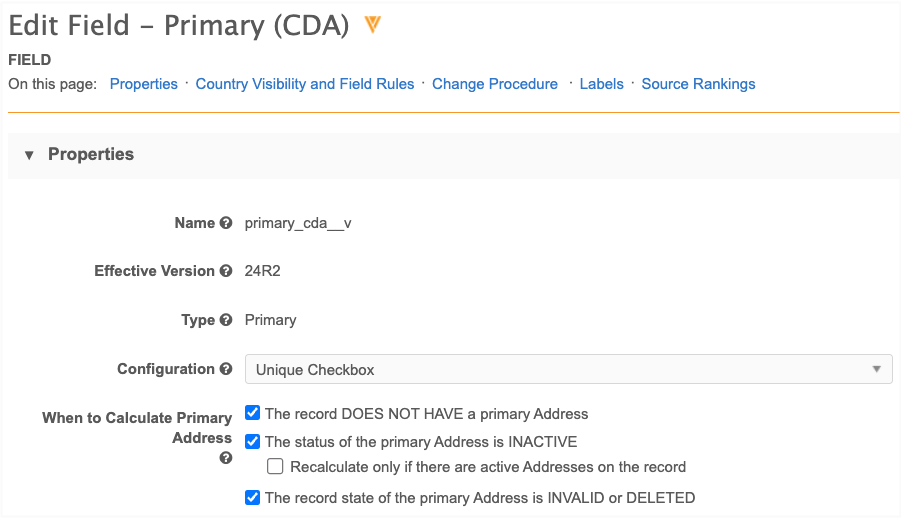
Calculated fields
Some locally managed fields are calculated fields. This means that the field values are populated by the CDA Sync process in your Network instance.
- state_cda__v
- city_cda__v
- postal_code_cda__v
CDA Sync applies to locally managed records only.
CDA Sync runs when data is updated in your Network instance, for example, through source subscriptions, data updater, DCRs, and merges. The process calculates the CDA field values using internal country-based rules or by mapping the corresponding legacy field value.

Note: CDA Sync must be enabled so calculated fields values can be populated.
Update fields
On locally managed records, calculated CDA fields are populated by the CDA Sync process.
The fields can be updated in the following ways:
-
Load data into the mapped legacy fields
The CDA Sync process will map the values to the calculated CDA fields.
Important: If calculated CDA fields are included in the import files, the data will be overwritten when CDA Sync runs.
For more details, see the CDA Sync section.
-
Submit data change requests on calculated CDA fields
The CDA Sync process will map the values to the legacy fields for Data Stewards to process.
For more details, see the CDA DCRs section.
Non-calculated fields
The CDA fields that are not calculated are managed just like legacy fields.
-
level_cda__v
-
adopter_type_cda__v
-
kol_cda__v
-
investigator_cda__v
-
speaker_cda__v
-
target_cda__v
-
year_of_birth_cda__v
-
age_range_cda__v
-
home_cda__v
-
billing_cda__v
-
shipping_cda__v
-
sample_shipping_cda__v
-
primary_cda__v
Update fields
The fields can be updated in the following ways:
-
Submit data change requests on the non-calculated fields.
-
Load the data into your Network instance
Include non-calculated fields in the import files.
CDA picklists
Many of the CDA fields are reference type fields (picklists). New reference types have been added to Network to support the CDA fields.
Restricted picklists
Custom (customer owned) reference codes cannot be added to these picklists.
-
AddressCountryCDA
-
AddressStateCDA
-
AdopterTypeCDA
-
AgeRangeCDA
-
HCPSpecialtyCDA
-
HCPSpecialtyGroupCDA
-
LanguageCDA
-
LevelCDA
-
StatusCDA
Unrestricted picklists
Custom reference codes can be added to these picklists
-
HCPTypeCDA
-
HCPMedicalDegreeCDA
Reference codes
Administrators and Data Managers can view the reference codes in the Network UI (Data Model > Reference Data).
Note: CDA reference codes are in lowercase, for example, dvm, dmd, md.
Multivalued reference types
Network supports multivalued reference types in version 24R2.0.
For details, see the "Multivalued Reference Fields" topic in these Release Notes.
CDA Sync
The CDA Sync process adds values to the calculated CDA fields based on the mapped legacy fields values or by using the internal Network rules defined for each country.
The process ensures that the Network and Vault CRM CDA data models are in sync to make integration seamless.
Enable CDA Sync
CDA sync is not enabled by default in Network instances.
-
New instances - The CDA data model is enabled by default. To populate CDA field values, enable CDA Sync
-
Existing instances - The CDA data model is off by default. When you enable all fields or individual fields, also enable CDA Sync so the field values are populated.
About CDA Sync
The CDA Sync process runs during data update jobs to map the legacy field values to calculated CDA fields.
CDA field calculations
CDA Sync rules use internal rules to map the values between the calculated CDA fields and the legacy fields.
There are default rules and rules for specific countries or regions. The rules might calculate the field values or map the value from the corresponding legacy field.
Example
| CDA Field | US Mapping/Calculation Rule | EMEA Mapping/Calculation Rule |
|---|---|---|
| state__cda__v |
Use administrative_area__v from the first address of the HCP record. - First address: primary_cda__v = Y- Reference code is lowercase |
Use administrative_area__v from the first address of the HCP record. - First address: primary_cda__v = Y- Reference code is lowercase |
| city_cda__v |
Use locality__v from the first address of the HCP record.
- First address: primary_cda__v = Y - Use first 40 characters |
Use locality__v from the first address of the HCP record.
|
| postal_code__v |
Use postal_code__v from the first address of the HCP record.
- First address: primary_cda__v = Y - Use first 5 characters |
Use postal_code__v from the first address of the HCP record.
- First address: primary_cda__v = Y - Use first 20 characters |
Supported jobs
CDA Sync runs last in any update job to ensure that all processes are complete (for example, merges and NEX rules) before the value is calculated. This way, the legacy fields and the CDA fields have the same values.
This includes the following jobs:
-
Source subscription (including simulated jobs)
-
Data updater
-
Data maintenance jobs
-
Merge
Winning and losing records are updated.
-
Unmerge
New record and the existing record of the unmerge are updated
-
Data change request
-
OpenData subscription and ad hoc jobs
Local addresses and fields only. CDA fields that are managed by OpenData are pushed to your Network instance in the same way that legacy fields are.
After these jobs run, the CDA field values on the updated records will be calculated.
CDA Sync runs on active fields only. If the legacy field or CDA field is not active, a value will not be calculated.
Supported records and fields
CDA Sync runs in your Network instance on locally managed records.
It applies to calculated CDA fields that are locally managed. CDA Sync runs on active fields only. If the legacy field or the CDA field is not active, the CDA field value will not be calculated.
Third party records
Calculated CDA fields are populated by Network on third party records. The calculated CDA fields must be locally managed; they cannot be managed by third party data providers.
On a third party data source configuration (Systems), calculated CDA fields are dimmed in the Available Fields panel. They cannot be moved to the Selected Fields panel to be managed by the third party provider.
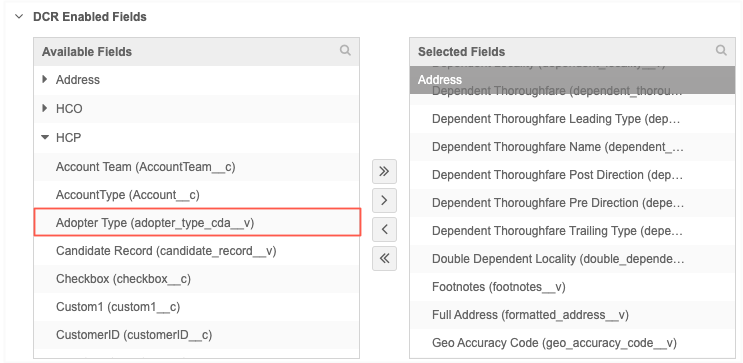
Backfill existing records
On existing locally managed records, CDA field values will be calculated when those records are touched or updated.
CDA DCRs
Add and change requests can be submitted for CDA fields from the following:
-
Vault CRM
-
Network UI
-
Network API
Key highlights
There is minimal impact to local Data Stewards for DCR processing.
-
Data Stewards will continue to process changes to the legacy fields; changes submitted to calculated CDA fields are mapped to the corresponding legacy field.
-
Calculated CDA fields display as read-only on DCRs and are contained in the CDA fields section.
-
Non-calculated CDA fields can be processed the same way as the legacy fields.
To understand how CDA fields are processed in DCRs, download the following file:
CDA DCR Field Mappings 24R2 August 9th 2024.xlsx
Prerequisite
The Enable CDA Sync setting must be on so add requests on CDA fields can be processed.
CDA Sync will map the CDA fields to legacy fields.
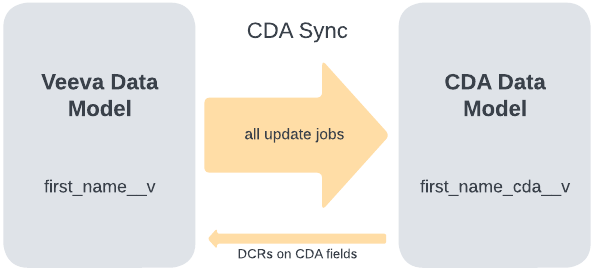
If Enable CDA Sync is off, change requests on CDA fields will be processed without updating the legacy fields.
Processing DCRs
Data Stewards can continue to process the legacy fields and custom fields on DCRs.
The following behavior occurs on the DCR page:
Calculated CDA fields
-
Changes submitted to calculated CDA fields are mapped to the legacy fields.
-
Network adds the legacy fields to the DCR. They display as regular DCR fields.
-
Data Stewards can accept, modify, or reject the changes on the legacy fields as usual.
-
The calculated CDA fields that were submitted on the DCR display in a separate section with the message Calculated Field to indicate that no action is required.
Noncalculated CDA fields
-
Display as regular DCR fields. Data Stewards can accept, modify, or reject the changes as usual.
Example DCR
On this add request, a user submitted the required values on the First Name CDA and Last Name CDA fields. The CDA field values are mapped to the legacy fields, so Data Stewards can process the changes on the legacy fields.
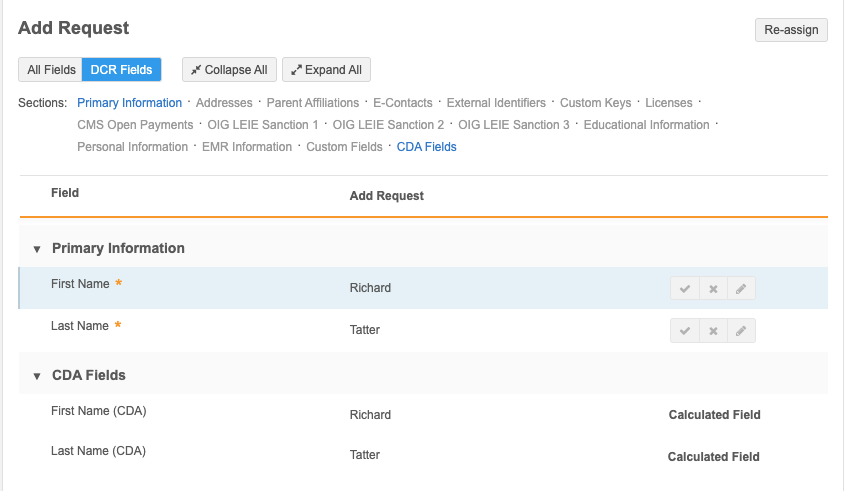
If Data Stewards change a value, the existing values on the DCR are not auto-calculated. The calculation occurs only when you click Apply.
DCRs for legacy fields
-
If DCRs contain changes to legacy fields, the corresponding CDA fields do not display on the DCR page.
-
DCR values on legacy fields are not overridden by CDA Sync. During the DCR process, CDA Sync will update the CDA field values to the legacy fields.
CDA fields not supported for DCRs
Some CDA fields are not supported for DCRs.
-
Multivalued reference fields
DCRS for multivalued reference fields will be supported in a future release.
-
Read-only fields
These field values are calculated from rules only.
The following fields are not supported.
| Object | CDA Field | Reason |
|---|---|---|
| HCP | VeevaID__v | Read-only system field |
| HCP | country_cda__v | Read-only system field for change_request |
| HCP | state_cda__v | Read-only system field |
| HCP | city_cda__v | Read-only system field |
| HCP | postal_code_cda__v | Read-only system field |
| HCP | all_spec_cda__v | Multivalued field |
| HCP | spec_group_1_cda__v | Multivalued field |
| HCP | all_spec_group_cda__v | Multivalued field |
| HCP | all_degree_cda__v | Multivalued field |
| Address | latitude_cda__v | Read-only system field |
| Address | longitude_cda__v | Read-only system field |
Routing DCRs
The hcp_type__v field determines where DCRs are routed.
Considerations for custom HCP types
For add requests, if there is a custom HCP type on the legacy field that is not on the CDA field, the default HCP type will be used to route the DCR. For example, the default HCP type for US HCP records is Prescriber, so the DCR will be routed to Veeva OpenData.
Prefix field
The Prefix field is an exception to the way the other CDA fields are processed.
The prefix_cda__v CDA field is a text field, but the corresponding legacy field, prefix__v , is a reference type field.
If a DCR is submitted for the prefix_cda__v field, the text value is mapped to the prefix__v field. Data Stewards must change the text label to a supported reference code for the legacy field.
After the DCR is approved, the CDA Sync process will populate the prefix_cda__v field value for the translated label based on the record language.
Suspect Match
On Suspect Match tasks, Data Stewards will continue to process the legacy fields. Calculated CDA fields are mapped to the legacy fields, so they display in a separate section and they are read-only to avoid any duplication. This is the same behavior on DCR tasks.
CDA fields that are not calculated can be processed the same as the legacy fields.
Workflow settings
Workflow settings, for example, auto-approve add and change requests, are not supported for calculated CDA fields in this release.
Network API
The Change Request API and Retrieve Change Request API support CDA fields. Integration users can submit and retrieve DCRs on all CDA fields and legacy fields.
About the API response
When the DCR contains calculated CDA fields and CDA Sync maps the values to the legacy fields, the API records the legacy fields as a CHANGE_ADDED.
Note: The legacy fields display as normal requested fields on the DCR page for Data Stewards (Accept, Reject, Modify) regardless of the API field status.
When Data Stewards process the changes (add, modify, or reject), all calculated legacy fields have a status of CHANGE_ADDED in the API response unless the change is rejected.
-
Accepted = CHANGE_ADDED
-
Modified = CHANGE_ADDED
-
Rejected = CHANGE_REJECTED
Rejected field changes are not returned in the task in the API.
Network features for CDA
To support CDA, Network features are updated to include the CDA fields.
Record profiles
CDA fields display in the CDA Fields section on record profiles.
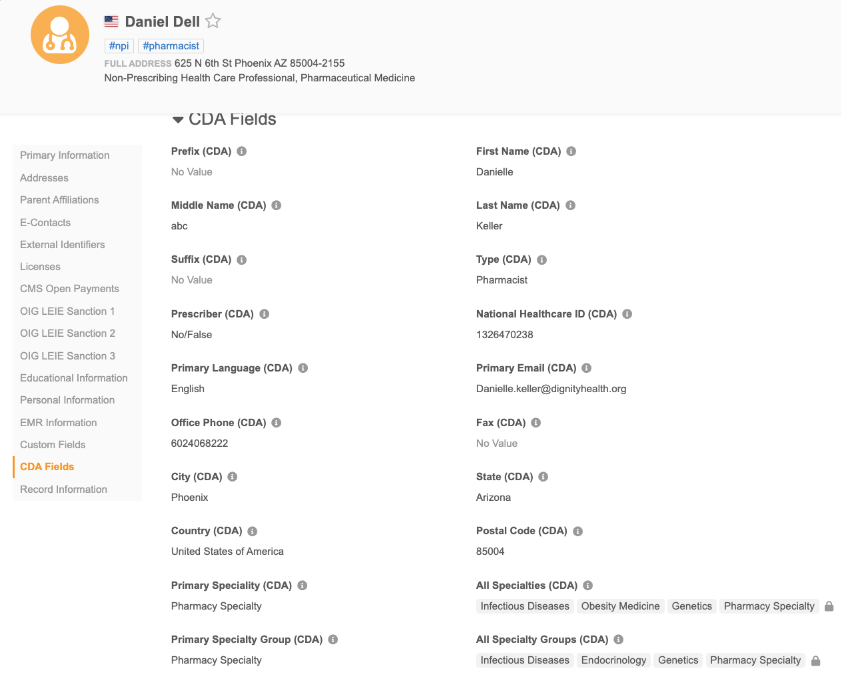
Profile layouts
Enabled CDA fields are added by default to all standard profile layouts except JPStandard and CNStandard layouts.
Most of the fields are located in the CDA Fields section, but some CDA Address fields are added to the Addresses section.
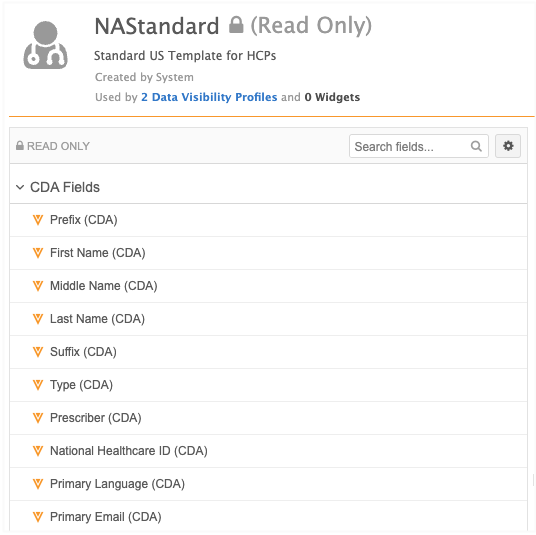
Note: CDA fields are read-only on Profiles in this release.
Network search
All enabled CDA fields are supported for search. This includes Advanced Search, Search API, and Search against OpenData.
Data lineage
CDA field updates are identified as Calculated Value in the Current Source column on the Data Lineage page.
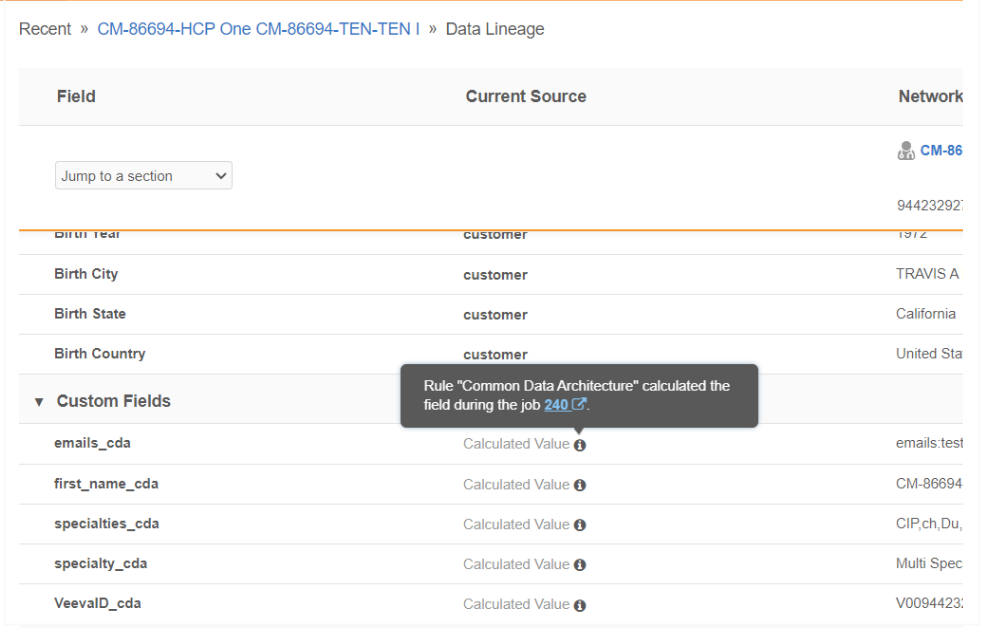
Match considerations
The default match rules are not being updated for this release. During the matching process, the legacy fields (__v) will continue to be used for matching.
Administrators can choose to use CDA fields in match rules. Ensure the CDA fields are consistently populated first.
Network Address Inheritance
CDA address fields can be copied from a parent address to a child address on locally managed records.
Note: CDA address fields that are calculated by CDA Sync are not copied during the address inheritance process.
On the Network Address Inheritance page (Data Model > Network Address Inheritance), you can choose the CDA address fields to copy from the parent's address.
In the Address Fields Sync section, only the non-calculated CDA fields display in the Available Fields column.
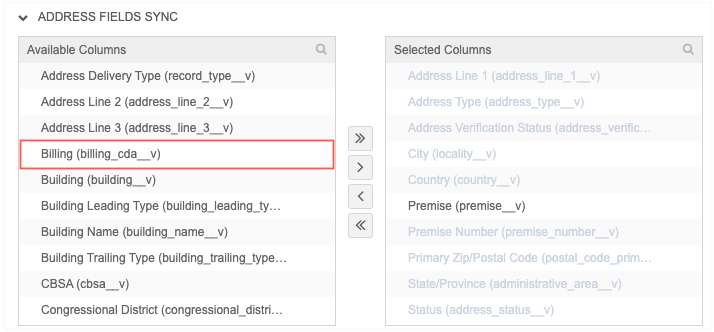
For example, you can move the billing_cda__v field to the Selected Columns panel so the value is copied from the parent address to the related child address.